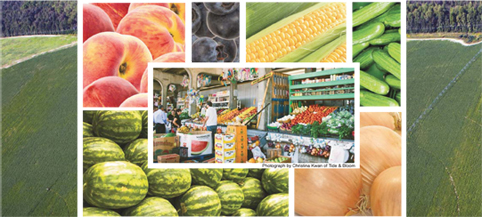Georgia’s Commissioner of Agriculture Gary Black has been a big supporter of the Georgia Grown movement; and Bryan Thornton, general manager of Coosemans Atlanta, Inc., appreciates Black’s influence. “The inception of Gary Black has helped the industry, just letting people know about and using ‘Georgia Grown’ to connect people has been instrumental in growth.”
Looking specifically at the case of Vidalia onions, local demand is traditionally high, and Shuman Produce uses Georgia’s unique connection to the sweet onions to sell the product. “This past season, we went to market with the story of this one-of-a-kind onion,” Shuman says, explaining how the history and people behind planting and harvesting Vidalias were the basis of the company’s ‘How to Speak Southern’ marketing campaign. The campaign included video content, social media engagement, educational resources, in-store programs, distinctive point-of-sale displays, and even seasonal recipes.
While the locally grown movement’s top benefit is connecting consumers with the industry, so is charity work. For Shuman, giving back to the community has been an important aspect of his business, which led to Shuman Produce’s 13-year involvement with Produce for Kids.
“We started with a single retailer and only a handful of partner sponsors,” Shuman explains. “It’s evolved from a single annual campaign to a philanthropically based year-round resource,” he says, uniting the produce industry to not only educate consumers about healthy eating, but also in raising funds for children’s charities throughout the year. “I’m humbled by the success of Produce for Kids, and grateful to both our retail partners and the produce industry for supporting the program.”
RECENT CHALLENGES
Although Georgia’s produce industry is expected to grow from last year’s values, as is the state’s gross domestic product, the past year has brought a number of challenges old and new—ranging from food safety to heat waves to a lack of qualified help. Although Georgia was blessed with a mild spring full of rain and sunshine, not all the weather was beneficial.
Thornton, for one, takes the weather in stride, noting it did not impact sourcing as much as it could have. “We can jump around from different growing regions,” he says. “We’ve faced weather issues in the past, so we’ve become accustomed to adversity in the supply chain.”
Helping Hands: Labor
According to U.S. Department of Agriculture (USDA), Georgia ranks first in national production for blueberries and spring season onions; second in cucumbers; third in peaches, sweet corn, and watermelon; and fourth in bell peppers, cantaloupe, and snap peas. The state is also the national production leader in peanuts and pecans.



